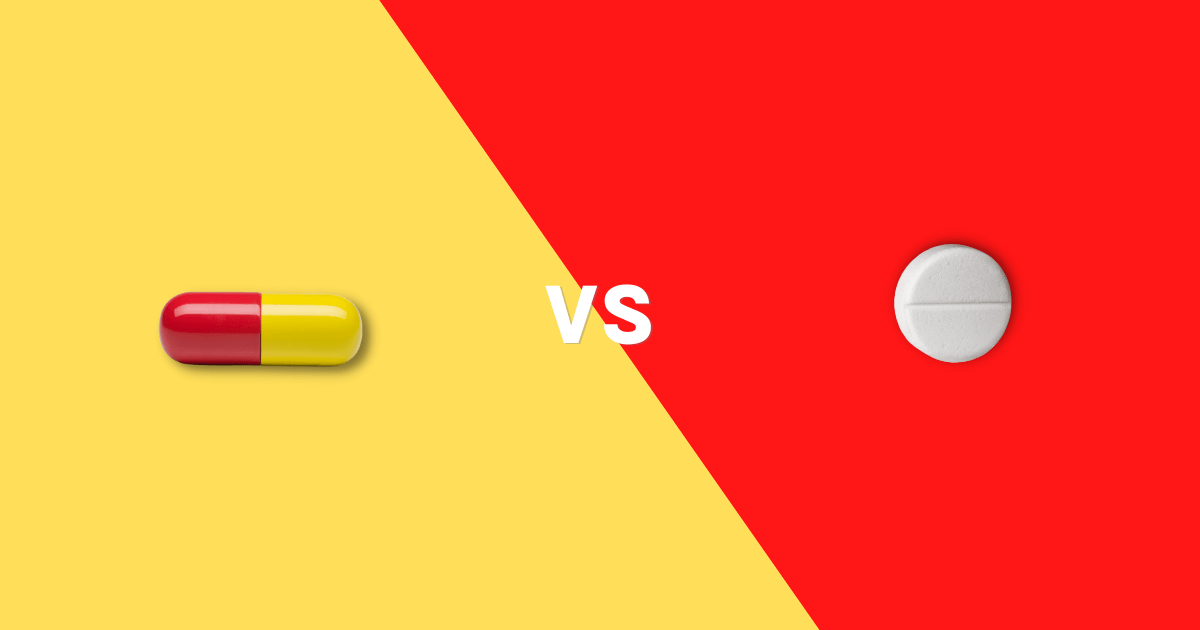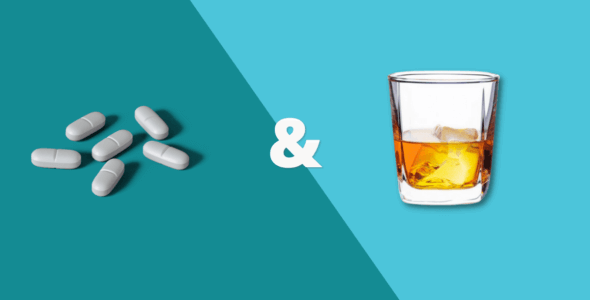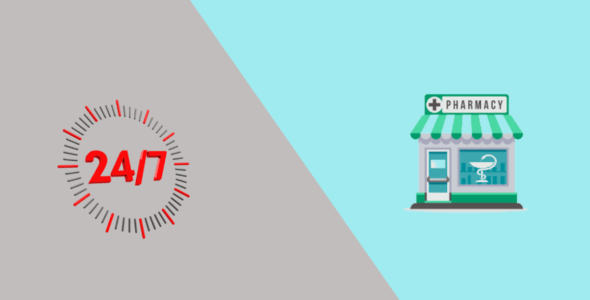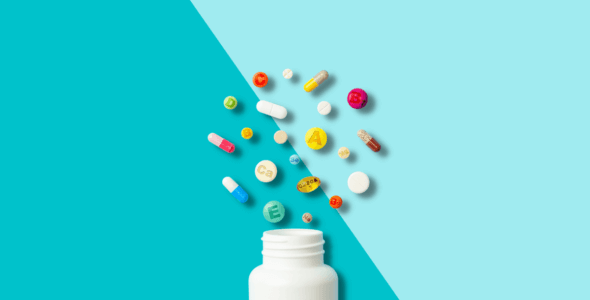Capsule vs tablet: what’s the difference?
Table of contents
- What is a tablet?
- What is a capsule?
- What are the key differences between capsules and tablets?
- Capsule vs tablet absorption
- Difference between capsule and caplet
- What are the disadvantages of capsules?
- What are the disadvantages of tablets?
- What are some tips for swallowing large pills?
- Tablets vs capsules: which is better?
There are two main choices of oral medication available: capsules and tablets. Capsules and tablets work by delivering a medication or supplement through your digestive tract for a specific medical purpose.
Wondering which one is right for you? Although capsules and tablets work similarly, there are some differences between them. In some circumstances, one form may be more suitable for you.
Learn more about the advantages and disadvantages of tablets and capsules to help you make an informed decision.
What is a tablet?
A tablet is a small, round, solid piece of medication that is taken orally. Tablets are usually made of compressing powder and can come in different shapes and sizes.
Tablets are manufactured by compressing powdered ingredients together to manufacturer a solid tablet that is absorbed in the digestive tract.
There are three main methods for manufacturing tablets: direct compression, dry granulation, and wet granulation:
- Direct compression is the simplest and most common method. The ingredients are mixed and then compressed into tablets without adding any liquid binders.
- Dry granulation involves mixing the ingredients and then compressing them into a tablet. This method is often used when the ingredients do not flow well or if they are too fine to be directly compressed.
- Wet granulation involves mixing the ingredients with a binding agent, such as water, and then compressing them into a tablet. This method is often used when the ingredients do not flow well or if they are too fine to be directly compressed.
In most cases, tablets also contain inactive ingredients or excipients for binding all of the ingredients in the tablet together.
Tablets are primarily manufactured in three shapes: oblong, round, or disc-shaped. Oblong tablets are also referred to as caplets, which are easier to swallow.
Some tablets have a line across the middle of the pill, which makes the tablet easier to break in half.
As well, some tablets are manufactured with a special coating for preventing the medication from breaking down in the stomach, which helps to ensure that the tablet will only dissolve after it has entered the small intestine.
There are four main types of tablet forms: chewable tablets, orally disintegrating tablets, sublingual tablets, and effervescent tablets.
Chewable tablets
Chewable tablets are intended to be chewed before being swallowed and absorbed rapidly in the stomach, resulting in a quick onset of action. They may come in various flavors.
Orally disintegrating tablets (ODT)
Manufactured to dissolve rapidly on the tongue without water, going directly into the bloodstream and working the fastest.
Sublingual tablets
Placed under the tongue to dissolve and be rapidly absorbed into the bloodstream.
Effervescent tablets
Dissolved in water to form a solution or suspension and drunk orally. They come in various fruit flavors and may contain antacids or decongestants.
What is a capsule?
Capsules are medications that are enclosed in an outer shell that is absorbed in the digestive tract. The medication in the capsule is absorbed into the bloodstream and is distributed and metabolized similar to medication that is formulated in a tablet.
There are two common types of capsule forms: hard-shelled capsules and soft-gel capsules.
Hard-shelled capsules
Hard-shelled capsules are made of two pieces: the capsule shell, which is made of gelatin, and the cap, which is made of cellulose. The medication is typically in powder form and is placed into the capsule shell. The cap is then placed onto the shell to close it.
Soft-gel capsules
Soft-gel capsules are made of a soft, gelatinous outer shell and contain a liquid form of medication. The outer shell is made of gelatin and glycerin, and the inner portion contains the medication.
What are the key differences between capsules and tablets?
While both capsules and tablets are safe to take, there are various differences between them. Here is a breakdown of the key differences:
Composition
Capsules are typically made of gelatin or vegetarian-friendly alternatives and contain a powder or liquid form of medication.
Tablets are usually made of compressed powder.
Absorption
Capsules offer better protection against stomach acids so the medication is not degraded. Capsules are composed of two parts: an inner suspension and an outer shell. The inner suspension may be in liquid, semisolid, or powdered form while the outer shell is usually made of gelatin. Capsules can have a higher level of bioavailability that results in the medication entering your bloodstream, making capsules slightly more effective than tablets.
Tablets are compressed powders that may contain binders, fillers, disintegrates, and other inactive ingredients.
Taste
Capsules can mask the taste of the medication, while tablets may have a bitter taste. As a result, capsules are less likely to have an unpleasant taste or odor.
Shelf life
Capsules generally have a longer expiration than tablets.
Animal products
Gelatin, which is derived from animal products, is used to make soft-shell capsules, which may not be desirable for vegetarians. Capsules can also be made from vegetarian-friendly alternatives. Tablets do not generally contain gelatin.
Size
Capsules come in a limited variety of sizes. Tablets also come in a variety of sizes, but they can be easily broken in half if needed. As there is a limited amount of space in a capsule, larger formulations are sometimes more practical to be formulated in a tablet as they allow tablet manufacturers to pack more product into a smaller space than with capsules or other delivery systems.
Splitting
Capsules generally cannot be split. Tablets that are scored can be easily split in half.
Chewable
Capsules are not chewable. Tablets can be made into chewable form, but they may not taste as good as capsules.
Unpredictability
Capsules offer an element of unpredictability as the contents may not be evenly distributed. Tablets are generally more predictable as the active ingredient is evenly distributed throughout the tablet.
Irritation
Capsules may irritate the stomach lining and cause nausea. Tablets are less likely to irritate the stomach lining.
Accuracy of prescriptions
Tablets can be split so patients may not follow their prescribed dose. On the other hand, capsules cannot be split so the patient will need to take the entire pill as prescribed by their doctor.
Capsule vs tablet absorption
Capsules offer better protection against stomach acids so the medication is not degraded. Capsules are composed of two parts: an inner suspension and an outer shell. The inner suspension may be in liquid, semisolid, or powdered form while the outer shell is usually made of gelatin. Tablets are compressed powders that may contain binders, fillers, and other inactive ingredients. Consequently, tablets generally have better absorption than capsules.
Difference between capsule and caplet
A capsule is a two-piece enclosure, typically made of gelatin, that contains a powder or liquid form of medication. A caplet is a solid dosage form that resembles a capsule in shape but is usually coated to make it easier to swallow. Capsules are generally not coated and are meant to be swallowed whole. Caplets may be coated with an enteric coating, which protects the medication from being degraded by stomach acids. Capsules are not coated and may irritate the stomach lining.
What are the disadvantages of capsules?
- Less stable and durable than tablets, and may be susceptible to environmental conditions, specifically humidity.
- Shorter expiration date than tablets.
- More expensive to manufacturer than tablets.
- May contain animal ingredients such as gelatin which aren’t favorable for vegetarians.
- Lower doses are available as the capsule size cannot accommodate larger formulations.
What are the disadvantages of tablets?
- May have a bitter taste.
- More likely to irritate the gastrointestinal tract.
- Extended-release tablets may not be split so patients may not follow their prescribed dose.
- Once in the body, they are slower acting than capsules and take longer to work in the body.
- Unlikely to break down evenly in the system.
What are some tips for swallowing large pills?
Many people can find swallowing large pills uneasy.
Both capsules and tablets may present challenges with swallowing. Tablets are hard and stiff, and some types of tablets could be more challenging to swallow than others. As well, some capsules can be large and difficult to swallow, especially particularly soft gel capsules.
There are some recommended strategies that you can try to make it less challenging to swallow a capsule or tablet.
- Drink from a bottle that has a narrow opening.
- Lean forward slightly when swallowing the pill.
- Add the pill to a food that is semi-liquid, for example, pudding or applesauce.
Tablets vs capsules: which is better?
It depends on your individual circumstances. The best form is the one that is most effective for the person who is taking the medication. While both capsules and tablets have a similar purpose, they have some differences as well.
Tablets come in a various forms and have a longer shelf life than capsules. They also contain higher doses of the active ingredients than capsules can accommodate. Tablets are slower acting than capsules, and in some cases, tablets may disintegrate unevenly in the body.
Capsules are faster acting than tablets, as the majority, if not all, of the drug is absorbed in the body once the capsule is taken. However, capsules generally expire more quickly than tablets, and cost more money.
If you are allergic to certain additives, require a vegan option that excludes capsules as an option for you, or have challenges swallowing large pills, speak with your doctor who will help you identify the best capsules or tablet for your needs.
If you still aren’t sure which one is better for you, speak to your healthcare for medical advice.
Medically reviewed
A medical professional has reviewed this article.


Jamie Winn, PharmD
Jamie Winn, PharmD
Dr. Jamie Winn received his Doctor of Pharmacy in 2002 from the University of South Carolina College of Pharmacy, Columbia, SC. Jamie is a medical reviewer for NiceRx.




